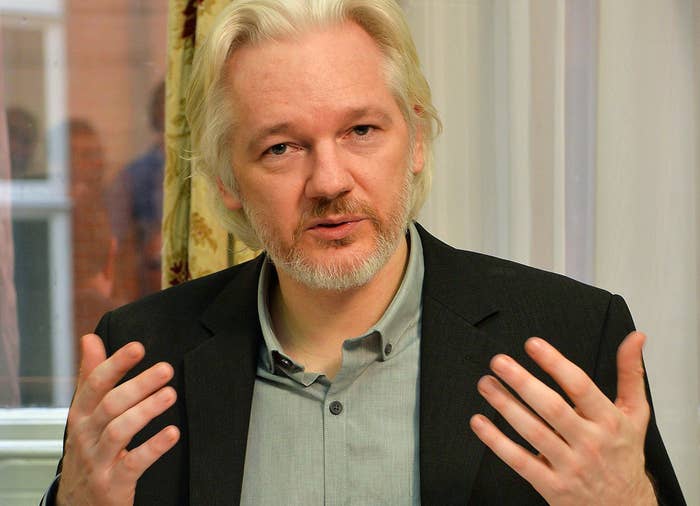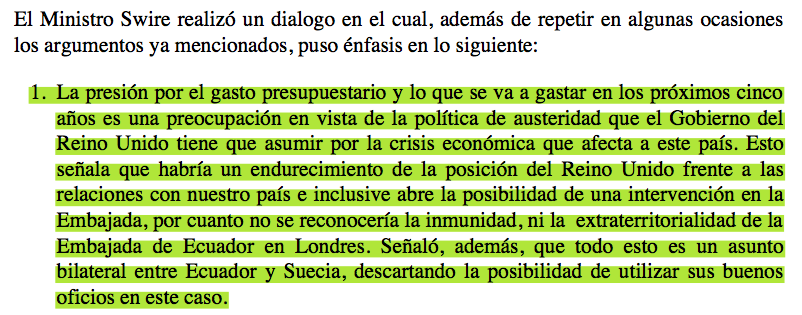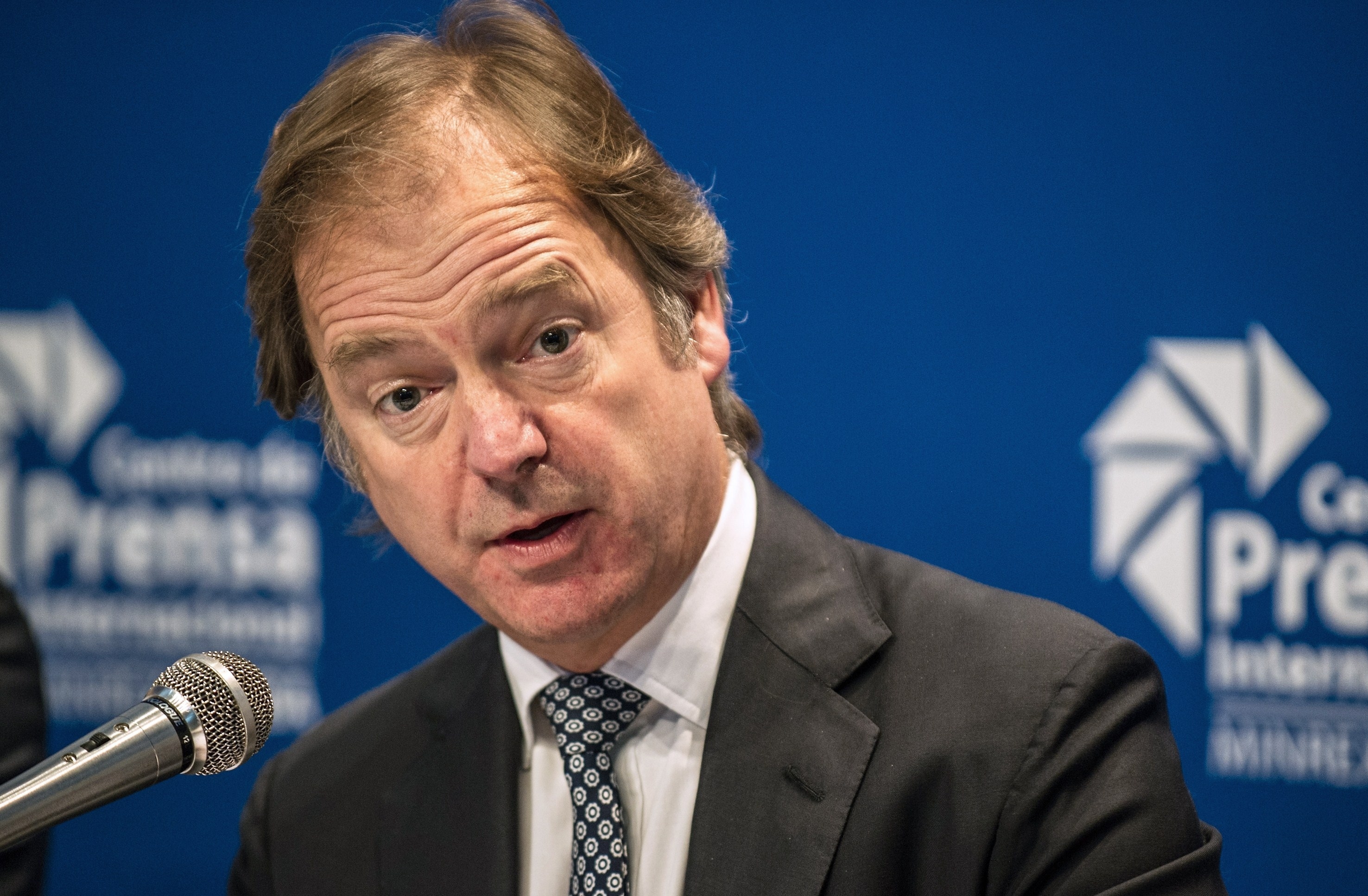
The British police operation to prevent Julian Assange escaping from the Ecuadorean embassy appears to have been a victim of the Conservative government's "politics of austerity", according to leaked documents seen by BuzzFeed News.
An Ecuadorean government memo reveals that a British government minister suggested to Ecuador's ambassador two months ago that the spiralling costs of the three-year diplomatic stand-off over the WikiLeaks founder were unsustainable in the current economic climate.
The meeting took place in August, just weeks before the surprise decision – announced on Monday – to withdraw the police guard from outside the Knightsbridge embassy that has housed Assange since 2012.
The message, delivered by Foreign Office minister Hugo Swire, was taken by Ecuador as a signal that the UK might invade its embassy or harden diplomatic relations, according to the ambassador's note of the meeting.
Assange sought refuge at the embassy in a bid to avoid extradition to Sweden to face questioning over allegations of sexual assault and rape made by two women. He was granted asylum by Ecuador over claims that the US was also seeking his extradition over his publication of leaked documents.
The subsequent policing operation outside the embassy has cost the UK more than £12 million, until it was abruptly withdrawn on Monday after the Metropolitan police said the expense was "no longer believed proportionate". The cost had been a frustration to London's mayor, Boris Johnson, who previously indicated he had "made representations" to central government over the issue.

The Ecuadorean ministerial memo details the conversation on 13 August between former Grenadier Guard Swire and the ambassador, Carlos Ortíz.
According to Ortíz's note to his superiors, Swire "put emphasis" on a number of key points, the first of which was the cost pressures faced by the UK.
"The pressure of budget spending and what will be spent in the next five years is a concern in view of the politics of austerity that the UK government has adopted because of the economic crisis affecting the country," the note stated.
"This indicates," Ortíz continued, "that there would be a hardening of the position of the United Kingdom in terms of relations with our country and even opened the possibility of an intervention in the Embassy, because its [diplomatic] immunity is not recognised and neither is the extraterritoriality [a legal term referring to embassies being outside the jurisdiction of their host country] of the Embassy of Ecuador in London."
This was interpreted by Ortíz as a threat, veiled or otherwise, to invade the embassy, though his memo does not make it clear whether the statements about an "intervention" were direct comments from Swire or the ambassador's understanding of the minister's meaning.
The section concludes with Swire refusing to act as a broker between Ecuador and Sweden.
"He further stated that all of this is a bilateral issue between Ecuador and Sweden, ruling out the possibility of using his good offices in this case," the document records.

The issue of recognition of the embassy as territory is raised again by Swire in the briefing.
"He noted a significant discrepancy between the interpretation of the asylum of Mr Assange on the part of the government of Ecuador and the UK," it records, "in the sense that the latter does not recognise even the territoriality of the Embassy, even less so the asylum."
By contrast, Ecuador refused to take any responsibility for the policing operation – and its costs – outside its embassy.
"The invasive police cordon around the Embassy of Ecuador in London can only be explained by political reasons rather than police ones," the ambassador is recorded as telling Swire. "[And] therefore only the British Government can explain such an abusive police deployment and its costs."

The meeting also records Swire's apparent frustration at the three-year diplomatic stand-off on the streets of Knightsbridge.
"Swire said Ecuador was losing credibility with the international community because their defence of human rights only focuses on Mr Assange, disregarding the human rights of the women accusing him," the memo notes at one point.
At no point in the Ecuadorean account of the meeting does Swire or the Ecuadorean ambassador discuss any possible extradition — or request — from the United States, the ostensible reason for Assange's asylum.
Swire does, however, apparently question whether Ecuador was raising "obstacles" to prevent the questioning of Assange by Swedish authorities.
"With regard to 'obstacles' placed by Ecuador to finish the investigation in the Embassy of Ecuador in London," the account notes, "I told him that Ecuador over the past three years has been willing and open to cooperate with the Swedish prosecutor to carry out its investigation."
When contacted for comment by BuzzFeed News, the Foreign Office pointed to a public statement made by Swire after the meeting in August.
"Ecuador must recognise that its decision to harbour Mr Assange more than three years ago has prevented the proper course of justice," he said.
"As a result, some of the serious sexual allegations against him will now expire. It is completely unacceptable that the British taxpayer has had to foot the bill for this abuse of diplomatic relations.
"I want to make clear that as an allegation of rape remains outstanding, the UK continues to have a legal obligation to extradite Mr Assange to Sweden. I have instructed our Ambassador in Quito to reiterate to Ecuador that the continuing failure to expedite the Swedish Prosecutor's interview, and to bring this situation to an end, is being seen as a growing stain on the country's reputation."
The London embassy of Ecuador did not respond to a request for comment.

